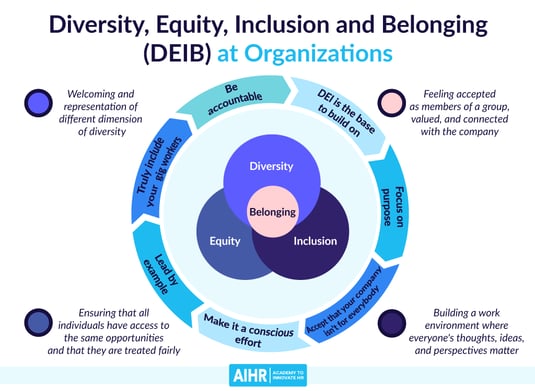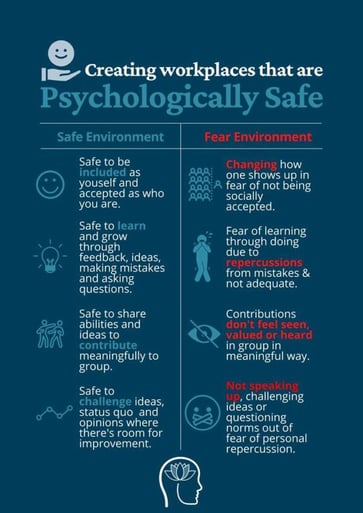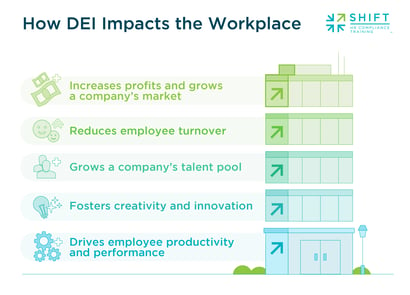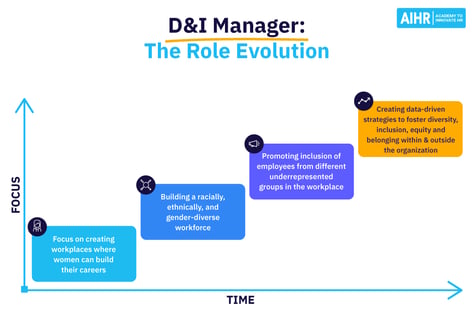It isn't deniable that workers are the ones who make the ideation process come alive. And the workplace culture matters the most for them to thrive for bigger accomplishments.
A study from Gallup says that if a company sets a diversified, equitable, and inclusive culture, then 27% of the turnover can be reduced and can witness a 12% increase in productivity.
In this article, we will learn how incorporating DEI (Diversity, Equity, Inclusion) makes a change for modern organizations. And what difference “Belonging” could make by including in DEI culture, thus bringing DEIB into the workspace. We will also discuss how people-first companies hire DEIB consultants and stay ahead of their competitors.
DEI simplified: understanding diversity, equity, & inclusion
Organizations with gender-diverse executive teams were 25% more likely to outperform on profitability, while those with ethnically and culturally diverse executive teams were 36% more likely to achieve above-average profitability.
Mckinsey & Co
Diversity refers to the differences among individuals, such as differences in race, ethnicity, gender, age, and more. When organizations prioritize diversity, they consciously try to create an inclusive workplace culture where all employees feel valued and respected, regardless of their differences.
Studies have shown that organizations with more diverse workforces tend to perform better financially and have a more positive work environment. A research study conducted by McKinsey & Company found that “Companies in the top quartile for gender diversity are 15% more likely to have financial returns above their respective national industry medians.”
Imagine a workplace where everyone has different backgrounds, perspectives, and ideas. When these diverse individuals collaborate, they bring fresh insights and innovative solutions. It leads to increased creativity and productivity and helps the organization stay ahead of the competition.
----
Equity refers to fairness and impartiality in distributing resources and opportunities. In the workplace context, equity means ensuring that all employees have equal opportunities for growth, development, and advancement, regardless of their background or personal characteristics.
Studies have shown that organizations with more equitable workplace practices tend to have higher levels of employee satisfaction, engagement, and productivity levels. For example, a research study by Deloitte found that “Companies with more diverse and inclusive cultures experience lower employee turnover, higher levels of employee engagement, and better financial performance.”
—--
Inclusion can be defined as the conscious effort to create a diverse and welcoming workplace where employees feel a sense of belonging and have equal opportunities to succeed and grow. It involves creating a culture that embraces and leverages employee differences to drive innovation and improve performance.
Inclusion is more than simply tolerating diversity; it actively seeks to understand, appreciate, and utilize each individual's unique perspectives and contributions.
💡 Gain insights on the state of your DEI or DEIB initiative
EngageRocket allows you to collect feedback from your employees on things that actually matter. Ask the right questions, send out questions, and get feedback - quickly.
The evolution of DEI: why is 'B' in DEIB important
The concept of Diversity, Equity, and Inclusion (DEI) has transformed in recent years with the addition of "B" for Belonging.
Belonging in the workplace was first identified through research in psychology and sociology, which found that when individuals feel a sense of belonging to a group, they are more motivated, engaged, and satisfied with their experiences. This concept was later applied to the workplace, and multiple studies have shown the positive impact of belonging on employee outcomes.
Belonging encompasses the sense of connection and identification employees feel with their organization and colleagues. It goes beyond simply valuing and respecting workplace diversity and addresses the fundamental human need for connection and a sense of purpose in the workplace.

Source: AIHR
Culture Report data in 2021, which examined the “Belonging” aspect in the organization, revealed that it added success to the organization:
-
With belonging, it boosted productivity in their workplace: 45% of the respondents said that.
-
A sense of belonging could retain 40% of the employees from going elsewhere looking for a job.
-
It could finally promote the company to other workers to join: 51% of the respondents said that.
DEIB vs. DEI: the difference “Belonging” makes
DEI focuses on creating a workplace environment that is diverse and inclusive, where differences are recognized and respected. It helps to create a workplace culture that is fair and equitable for all employees. By prioritizing DEI, organizations can increase diversity in the workplace, improve employee morale and satisfaction, and promote a more positive and inclusive workplace culture.
DEIB, on the other hand, takes DEI a step further by emphasizing creating a sense of belonging for all employees. It means that the organization strives to be inclusive and respectful of differences and actively works to create a workplace culture where all employees feel valued, supported, and have a sense of belonging to the organization.
|
DEI
|
DEIB
|
|
Focuses on creating a diverse and inclusive workplace
|
Focuses on creating a diverse, inclusive, and welcoming workplace where employees feel a sense of belonging.
|
|
Prioritizes creating an inclusive environment
|
Promotes a sense of belonging for all employees
|
|
Emphasizes the importance of recognizing and respecting differences
|
Emphasizes the importance of recognizing and appreciating differences, as well as actively creating a welcoming and supportive workplace culture
|
|
Aims to address issues of equity and fairness in the workplace
|
Aims to address the problems of equity, fairness, and promoting a sense of belonging in the workplace
|
DEIB in the workplace: the positive impact on employee satisfaction and business success
The feeling of being left out is a significant cause of stress in the employees' minds, but it also affects the potential productivity of an employee. It is such a prominent factor that determines a healthy work environment. However, it has vastly been overlooked!
The DEI movement is rooted in the belief that every person deserves equal treatment and opportunities in the workplace. Despite companies’ good intentions and substantial investments in DEI initiatives, many still fail to realize significant results. Several studies, including one by Harvard Business Review, have found that many employees, as many as 40%, feel disconnected and isolated in their work environment.
The disparity between investment and outcome is even more startling when considering the sheer amount of resources poured into DEI efforts. Research shows that US businesses spend nearly $8 billion yearly on diversity and inclusion training.
Despite these efforts, it is clear that simply investing in DEI initiatives is not enough. Organizations must take a more comprehensive and strategic approach to foster a truly diverse, inclusive, and equitable workplace. Only then can they hope to reap the benefits of an increasingly innovative and productive workforce filled with self-motivation to outperform and critically thrive in the workplace, thereby accomplishing the full potential of the DEI efforts.

Source: Dan and Carol
In addition to its impact on the workplace and business outcomes, it is also relevant to consider the emotional and psychological effects of DEI initiatives on employees. While DEI efforts aim to create a more inclusive and supportive work environment, implementing these changes can bring about uncomfortable conversations and emotions for some employees.
For the minority groups, the focus on DEI can bring to light any discriminatory and marginalized past experiences that they may have encountered, leading to anger, frustration, and even hurt. At the same time, members in the majority group may feel defensive or unsure of how to engage in DEI conversations and initiatives.
Most large corporations have made strenuous efforts to nullify such instances. Microsoft has taken serious steps to mitigate racial injustice and will invest $150M in D&I initiatives.

Source: Shiftelt
It is believed that when employees feel valued and included, they are more likely to bring their unique perspectives and experiences to the table, leading to a more diverse pool of ideas.
A workplace culture that embraces diversity and inclusion fosters a sense of psychological safety, where employees feel comfortable taking risks and sharing new ideas. This can lead to increased innovation and problem-solving capabilities, as employees are more likely to collaborate and work together effectively.
Think of it as a puzzle. Each piece represents a unique perspective, creating a complete picture; when they come together. The more details you have, the more robust the solution. The same goes for a diverse workforce. By leveraging employees' diverse perspectives, experiences, and backgrounds, organizations can create more well-rounded solutions and approach problems from multiple angles.
Research supports this. A study found that companies in the top quartile for ethnic and racial diversity are 35% more likely to have financial returns above their respective national industry medians. Furthermore, companies in the top quartile for gender diversity are 15% more likely to outperform on profitability.
Another study by Deloitte found that organizations with a higher degree of diversity are better positioned to innovate and grow. The study found that companies that were more diverse in terms of gender, ethnicity, and age were better equipped to tackle complex business problems, had a more agile decision-making process, and experienced improved financial performance.
Why do you need a DEIB Consultant?
A DEIB (Diversity, Equity, Inclusion, and Belonging) consultant is needed because organizations are recognizing the importance of creating a workplace culture that values diversity, equity, and inclusion, and promotes a sense of belonging for all employees.
Diversity, equity, and inclusion are crucial for building a healthy and productive workplace, where everyone feels valued, respected, and has equal opportunities to succeed. However, it can be challenging for organizations to create and maintain a DEIB-focused culture, especially in a rapidly changing world where demographics and cultural norms are evolving.
DEIB consultants bring a wealth of expertise and knowledge to help organizations address and overcome these challenges. They work with leaders and employees to create DEIB strategies, develop and deliver training programs, facilitate conversations around sensitive topics, and advise on best practices for creating a more inclusive workplace.
But does your company need to hire a DEIB Consultant?
A DEIB (Diversity, Equity, Inclusion, and Belonging) consultant is needed because organizations are recognizing the importance of creating a workplace culture that values diversity, equity, and inclusion, and promotes a sense of belonging for all employees.
Diversity, equity, and inclusion are crucial for building a healthy and productive workplace, where everyone feels valued, respected, and has equal opportunities to succeed. However, it can be challenging for organizations to create and maintain a DEIB-focused culture, especially in a rapidly changing world where demographics and cultural norms are evolving.
DEIB consultants bring a wealth of expertise and knowledge to help organizations address and overcome these challenges. They work with leaders and employees to create DEIB strategies, develop and deliver training programs, facilitate conversations around sensitive topics, and advise on best practices for creating a more inclusive workplace.
Whether a company needs to hire a DEIB consultant depends on various factors, including the organization's size, DEIB goals, current DEIB practices, and resources available in-house.
Here are some factors to consider:
-
DEIB Goals: If a company is looking to create a more diverse, equitable, inclusive, and belonging workplace culture, they may benefit from the expertise of a DEIB consultant.
-
Current DEIB practices: If a company already has DEIB initiatives in place, but they are not having the desired impact, a DEIB consultant can help assess and improve these programs.
-
Resources available in-house: If a company does not have the resources, expertise, or time to focus on DEIB initiatives, a DEIB consultant can provide support and guidance.
-
Size of the organization: Larger organizations may have the resources to hire a DEIB consultant, while smaller companies may prefer to focus on DEIB initiatives internally or with the help of outside resources such as training programs.
Ultimately, the decision to hire a DEIB consultant will depend on the specific needs and goals of the organization. However, organizations that are committed to promoting diversity, equity, and inclusion, and creating a culture of belonging, may find significant benefits from working with a DEIB consultant.
Tips for hiring a DEIB Consultant
Hiring a DEIB (Diversity, Equity, Inclusion, and Belonging) consultant can be a significant step towards creating a more inclusive and equitable workplace. However, with the growing demand for DEIB services, choosing the right consultant for your organization can take time and effort.
Essential qualities to look for in a DEIB professional
-
Expertise in DEIB principles and practices: A consultant should deeply understand the latest DEIB theories, research, and best practices. They should be able to advise organizations on how to create a more inclusive and diverse workplace.
-
Strong communication and interpersonal skills: An individual must communicate complex DEIB concepts to stakeholders of all levels and backgrounds. They should also be able to establish strong relationships with employees and build trust.
-
Understanding your organization's culture and goals: One should understand your organization's culture, values, and goals well. It will help them to tailor their approach to meet your specific needs.
-
Ability to drive lasting and meaningful change: A DEIB consultant should be able to design and implement DEIB initiatives that have a lasting impact on your organization. They should be able to track and measure the success of these initiatives.
-
Relevant experience and qualifications: Having relevant experience in DEIB consulting and having the necessary credentials, such as a certification in DEIB is quite essential.
-
Commitment to DEIB and diversity in their work and practices: One should be committed to promoting DEIB and diversity in their work and practices. It includes being aware of their own biases and taking steps to address them.
-
Empathy and cultural competence: Someone who is able to understand and appreciate the perspectives of people from diverse backgrounds. They should be able to create a safe and inclusive environment for all employees.
-
A positive, solution-oriented attitude: An individual should approach DEIB challenges with a positive, solution-oriented attitude. They should be able to identify and address DEIB challenges constructively and proactively.
DEIB Consultant interview questions to determine fit
Source: AIHR
By asking these questions, the interviewer can better understand the consultant's qualifications, experience, and approach to DEI and make an informed decision on whether they are the right fit for the organization.
Can you discuss your approach and experience in helping organizations with a history of exclusivity transform into more inclusive environments?
It helps assess the consultant's experience working with organizations with a history of exclusivity and their ability to create inclusive environments.
Can you discuss when you had to navigate a challenging situation related to DEI in the workplace?
It allows the interviewer to gauge the consultant's ability to handle challenging DEI situations, which are bound to arise in any workplace.
How do you measure the success of DEI initiatives and track progress over time?
It is essential to understand how the consultant measures the success of DEI initiatives and tracks progress over time. It helps ensure that the consultant will be able to assess the impact of their work effectively.
How would you handle a situation where an employee reported experiencing harassment from a coworker based on race or gender?
It is crucial to evaluate the consultant's ability to handle sensitive and complex situations related to harassment in the workplace.
What is the area of diversity and inclusion you consider the most pressing and vital to address, and why?
It helps assess the consultant's understanding of the most pressing and essential DEI issues and their priorities in addressing them. It can help ensure that the consultant is aligned with the organization's DEI goals.
Insight into the DEIB Consultant salaries across different career levels
Factors affecting DEIB consultant salaries
Industry: Different industries have varying levels of demand for DEIB consultants and the compensation they offer. For example, the technology and finance industries, known for their competitiveness and focus on innovation, may offer higher salaries to attract top talent. On the other hand, nonprofit and public sector organizations may have limited budgets for DEIB initiatives and, therefore, may offer lower salaries.
Location: The cost of living in a particular location can also play a role in determining the salary of a DEIB consultant. Consultants working in major metropolitan areas where the cost of living is higher may earn higher salaries to compensate for the higher cost of living.
Years of experience: The more experience a DEIB consultant has, the more valuable they are likely to be to potential employers. A consultant with several years of experience in DEIB is expected to command a higher salary than one with less experience. They have a proven track record of success and a deeper understanding of the DEIB field.
Average salaries for DEIB consultants
According to Glassdoor, the average base salary for entry-level, mid-level, and senior-level DEIB consultants in the United States is as follows
-
Entry-level DEIB consultants: An entry-level DEIB consultant with 1 to 4 years of experience can expect to earn an average base salary of $69,000 to $81,000 per year.
-
Mid-level DEIB consultants: A mid-level DEIB consultant with 5 to 10 years of experience can earn an average base salary of $88,000 to $94,000 per year.
-
Senior-level DEIB consultants: A senior-level DEIB consultant with over ten years of experience can earn an average base salary of $113,000 to $144,000 per year.
Diagnose your workplace's state of DEIB with EngageRocket
Building an inclusive workplace not only comes with a DEIB but with an ability to track current state and outcomes of the initiatives.
EngageRocket's BELONG solution allows organizations to collect feedback from their employees quickly and seamlessly. The analytics dashboard allows you to see overall results and compare key drivers between employee segments - so you can always tell if adjustments are needed.
Getting firsthand employee feedback in key areas such as belonging, autonomy, manager support, and compensation helps the leaders understand where the organization is currently in regard to inclusivity.
💡 Gain insights on the state of your DEI or DEIB initiative
EngageRocket allows you to collect feedback from your employees on things that actually matter. Ask the right questions, send out questions, and get feedback - quickly.
FAQs
Q: How can I measure the impact of a DEIB consultant's work?
A few ways to measure the effect include conducting employee engagement surveys, collecting diversity and inclusion metrics, gathering regular employee feedback, evaluating individual performance, and assessing business outcomes such as employee retention, productivity, and financial performance.
Q: How to hire a DEIB consultant?
To hire a DEIB consultant, start by defining your DEI goals and objectives, researching potential consultants, checking credentials and experience, scheduling interviews, asking for references, and making a decision based on your research and analysis. Then, choose a consultant who best meets your needs and goals for creating a more diverse, equitable, and inclusive workplace.
Q: What is the average salary of a DEIB consultant?
According to Glassdoor, the national average salary for a DEIB consultant in the United States is approximately $75,000 annually. Entry-level DEIB consultants may earn an average salary of around $60,000, while mid-level DEIB consultants may earn an average salary of roughly $80,000. Senior-level DEIB consultants may earn an average salary of approximately $100,000.

.jpg)



 .
. 